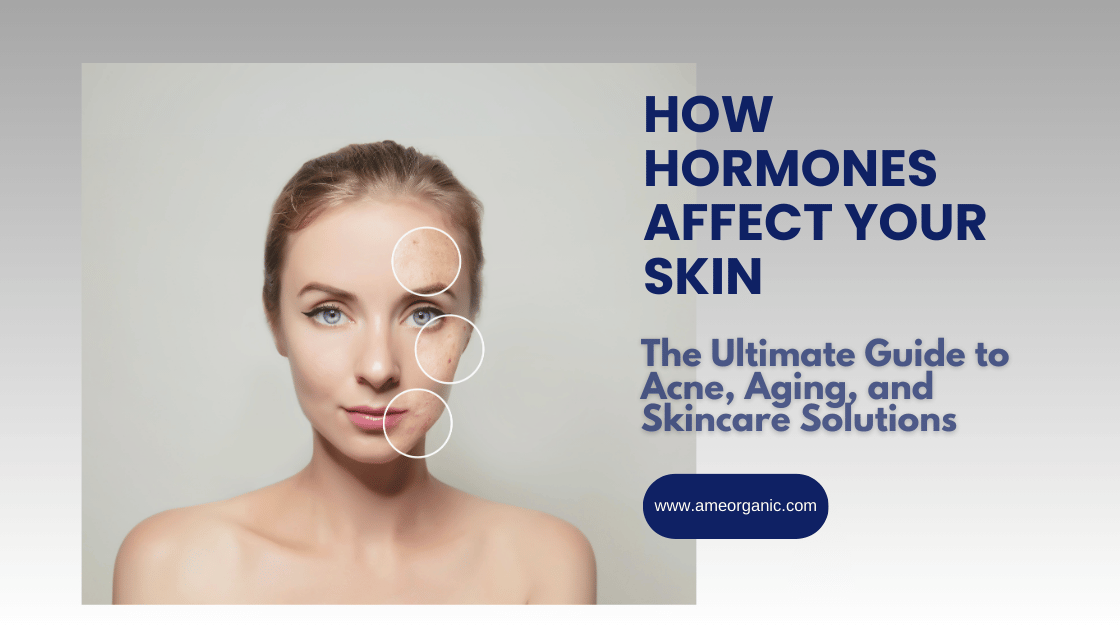Our skin, the largest organ in the human body, undergoes a constant battle against various internal and external factors. Among these factors, hormones emerge as key players in maintaining skin health. Hormonal fluctuations can trigger a cascade of effects on the skin, giving rise to common concerns such as acne, dryness, and premature aging. Understanding the intricate relationship between hormones and skin condition is crucial for developing effective skincare strategies. In this scientific blog, we will explore the profound impacts of hormones on the skin, supported by comprehensive research to unravel the complexities of this vital connection.
Estrogen's Role in Skin Health
Estrogen, a primary female sex hormone, significantly affects skin physiology. This hormone is crucial for various skin functions, including collagen production, skin thickness, hydration, and elasticity.
Estrogen's Role:- Estrogen, a primary female sex hormone, significantly affects skin physiology.
- It promotes collagen production, maintains skin thickness, and enhances hydration and elasticity.
Mechanism:
Estrogen receptors (ERs) are present in skin cells, including keratinocytes, fibroblasts, and melanocytes. When estrogen binds to these receptors, it stimulates the production of collagen and hyaluronic acid, both essential for maintaining skin structure and moisture.
Scientific Findings:
- Collagen Production: Research indicates that estrogen stimulates the production of type I and III collagen, which are crucial for skin strength and elasticity. A study published in Dermato-Endocrinology demonstrated that post-menopausal women who received estrogen replacement therapy (ERT) showed significant improvements in skin thickness and collagen content ,Estrogen and skin aging
- Hydration and Barrier Function: Estrogen increases the production of glycosaminoglycans (GAGs), such as hyaluronic acid, which retain water in the skin, improving hydration and barrier function. The decline in estrogen levels during menopause leads to decreased GAGs, resulting in drier and more fragile skin, Estrogen and skin aging
- Anti-Aging Effects: A study in the Journal of the American Academy of Dermatology found that estrogen helps reduce the appearance of fine lines and wrinkles by enhancing skin elasticity and thickness, Revisiting the Beneficial Effects of Estrogen on the Skin
Testosterone and Skin
Testosterone's Role:
- Testosterone, the primary male sex hormone, influences sebum (oil) production.
- It plays a critical role in the development of acne, especially during puberty.
Mechanism:
Testosterone stimulates sebaceous glands to produce more sebum. Androgen receptors (ARs) in the skin bind to testosterone, leading to increased sebum production, which can clog pores and contribute to acne formation.
Scientific Findings:
- Sebum Production: Elevated levels of testosterone are associated with increased sebum production, leading to oily skin and acne. A study in the Journal of Clinical Endocrinology & Metabolism highlighted that higher androgen levels correlate with more severe acne in both males and females, Revisiting the Beneficial Effects of Estrogen on the Skin
- Acne Development: Research in Acta Dermato-Venereologica found that testosterone influences the size and activity of sebaceous glands, directly impacting acne severity. This effect is particularly pronounced during puberty when hormone levels fluctuate significantlyEstrogen and skin aging
Progesterone and Skin
Progesterone's Role:
- Progesterone, another key female sex hormone, impacts skin elasticity and pore size.
- It can contribute to premenstrual acne and skin sensitivity.
Mechanism:
Progesterone receptors (PRs) in the skin modulate sebaceous gland activity and influence skin barrier function. High levels of progesterone can lead to water retention and swelling, which may tighten pores and lead to breakouts.
Scientific Findings:
- Cyclic Acne: A study in the Journal of the American Academy of Dermatology noted that progesterone fluctuations during the menstrual cycle contribute to cyclic acne, often worsening in the luteal phase (post-ovulation), Revisiting the Beneficial Effects of Estrogen on the Skin
- Skin Sensitivity: Progesterone can increase skin sensitivity and susceptibility to irritation. This hormone's effect on water retention can also lead to puffiness and temporary changes in skin texture, Estrogen and skin aging
Cortisol and Skin
Cortisol's Role:
- Cortisol, known as the stress hormone, affects skin aging and barrier function.
- Chronic stress and elevated cortisol levels can exacerbate various skin conditions.
Mechanism:
Cortisol receptors in the skin modulate inflammation and immune responses. High cortisol levels can break down collagen and impair the skin's barrier function, leading to dryness, irritation, and accelerated aging.
Scientific Findings:
- Collagen Breakdown: Chronic stress leads to prolonged elevation of cortisol, which can degrade collagen and elastin fibers, causing wrinkles and loss of skin firmness. An article in Experimental Dermatology linked high cortisol levels to increased signs of skin aging.
- Inflammation and Barrier Function: Research published in The Journal of Investigative Dermatology showed that cortisol impairs the skin barrier by reducing the production of ceramides, essential lipids that maintain moisture and protect against irritants, Revisiting the Beneficial Effects of Estrogen on the Skin
Thyroid Hormones and Skin
Thyroid Hormones' Role:
- Thyroid hormones regulate metabolism and influence skin texture and hydration.
- Imbalances can lead to significant changes in skin appearance and health.
Mechanism:
Thyroid hormone receptors (TRs) in the skin regulate keratinocyte proliferation and differentiation. Hypothyroidism (low thyroid function) can cause dry, coarse skin, while hyperthyroidism (high thyroid function) can lead to warm, moist skin.
Scientific Findings:
- Hypothyroidism: A study in the Indian Journal of Dermatology reported that hypothyroidism is associated with dry, rough skin, and hair loss. The reduced metabolic rate in hypothyroid patients leads to decreased sweating and sebum production, causing skin dryness.
- Hyperthyroidism: Hyperthyroidism increases metabolic activity, often resulting in warm, sweaty skin and sometimes thinning of the skin. This condition can also cause hair thinning and fragility, Revisiting the Beneficial Effects of Estrogen on the Skin
Hormonal Skin Conditions and Management
Acne
- Hormonal Influence: Elevated androgens (testosterone) increase sebum production and acne risk.
- Management: Treatments include topical retinoids, benzoyl peroxide, hormonal therapy (e.g., birth control pills), and anti-androgens like spironolactone.
Melasma
- Hormonal Influence: Often triggered by pregnancy hormones (estrogen and progesterone).
- Management: Treatments include hydroquinone, azelaic acid, and sun protection. Hormonal regulation can also help manage melasma.
Psoriasis
- Hormonal Influence: Stress-induced cortisol spikes can worsen psoriasis.
- Management: Stress management techniques, topical corticosteroids, and systemic treatments can help control symptoms.
Eczema
- Hormonal Influence: Can be exacerbated by stress and hormonal changes.
- Management: Moisturizers, topical steroids, and stress reduction techniques are effective in managing eczema.
conclusion
The intricate interplay between hormones and skin health is a fundamental aspect of effective skincare. Hormones such as estrogen, testosterone, progesterone, cortisol, and thyroid hormones exert significant influence on skin physiology, impacting processes ranging from sebum production to collagen formation. Understanding and acknowledging these hormonal effects enables the customization of skincare regimens to target hormonal imbalances, thereby promoting the maintenance of glowing and youthful skin. Embracing this knowledge is key to achieving radiant skin regardless of age.

